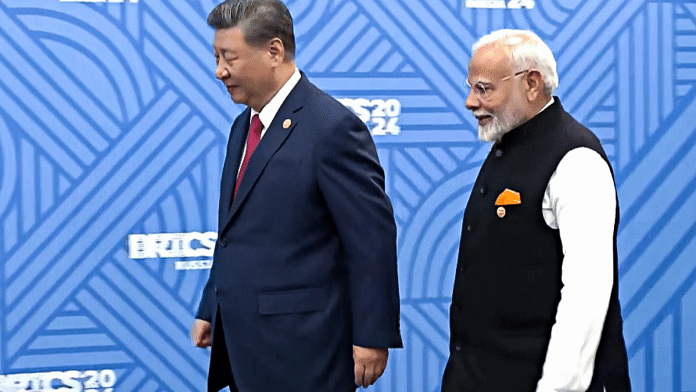New Delhi: A consensus emerged at a policy conference on BRICS+ in New Delhi Wednesday that a common BRICS currency offers no tangible benefits to India or the wider ‘Global South’.
Senior economist Montek Singh Ahluwalia, addressing the audience despite not being on a panel, strongly dismissed the idea of a BRICS common currency as ‘nonsense’. Other experts and policymakers present echoed this view.
“Whoever’s writing papers for the government should have the courage to say it: a common BRICS currency is not in India’s interest, or anyone else’s,” Montek Singh Ahluwalia emphasised.
Instead, Ahluwalia urged a focus on practical cooperation, such as free trade agreements and shared learning in energy and digital systems.
“It makes far more sense…,” Ahluwalia said, “…to talk about trading with Africa or learning from China’s power model than to dream of a shared currency.”
“BRICS would have been much better off as a small, serious voice of the ‘Global South’. It needs to stop behaving like a negotiating forum with no one on the other side and instead focus on internal reform and mutual learning,” Montek Singh Ahluwalia said. “We keep telling others what worked in India. It’s time we learn what worked elsewhere, like in China, in Europe, in the rest of the South.”
India is set to take over the chairmanship of the expanded BRICS+ grouping in 2026. It has already started positioning itself to play a more assertive role in redefining global economic governance.
This comes against the backdrop of the United States’ protectionism, currently threatening to upend decades of multilateral consensus.
On Wednesday, delivering a keynote address at a policy conference held by Chintan Research Foundation in New Delhi, Ministry of External Affairs’ Secretary (Economic Relations) Sudhakar Dalela, said that BRICS had “evolved beyond an economic grouping into a dynamic platform for the ‘Global South’’s strategic and developmental aspirations”.
“India’s upcoming chairmanship is a historic opportunity to institutionalise cooperation in areas such as digital public infrastructure, sustainable finance, and resilient supply chains,” he said, adding that the focus would be on more people-to-people ties and ensuring a balanced and inclusive world order.
BRICS+ now includes new members, such as Saudi Arabia, Egypt, and the United Arab Emirates (UAE). BRICS+ accounts for nearly half the population, and in purchasing power terms, 40 percent of the global GDP.
Independent think tank Chintan Research Foundation president Shishir Priyadarshi noted that BRICS “is not an alternative to the existing world order but a corrective mechanism to democratise decision-making”. He said that India must use its chairmanship to align the grouping’s priorities with those of the broader ‘Global South’—particularly in the fields of technology, finance, and connectivity.
Speakers, including South Africa’s Acting High Commissioner to India Cedrick Crowley, called for BRICS+ to adopt a “proactive and inclusive” approach to development, emphasising the role of new financial institutions in Africa’s growth.
“South Africa supports a strong BRICS initiative that builds economic resilience, deepens South-South cooperation, and revitalises the multilateral trading system. Reforming global institutions, including the UN, is not optional but essential to make them more representative of 21st-century realities,” he added.
‘De-dollarisation is not the aim’
BRICS risks “becoming a talk shop” if it continues to expand without focus, Ahluwalia warned, calling the idea of a common BRICS currency “nonsense”.
He also added that BRICS’ enlargement could dilute its effectiveness. “Every new member will want a paragraph in the communiqué. The result is only longer, vague statements and fewer concrete outcomes,” he said.
Speakers said the expansion of BRICS+—now representing nearly half the world’s population and accounting for 40 percent of the global GDP—has injected new momentum into the bloc. Now, the bloc has positioned itself as a key driver of global growth.
Experts urged the New Development Bank to finance sustainable infrastructure and digital transformation while aligning the BRICS Pay system and central bank digital currencies to reduce dollar dependency. They demonstrated the necessity of technological autonomy in AI, quantum computing, green energy, and secure digital ecosystems.
Citing US tariffs and carbon border taxes, panellists stressed the need for a unified ‘Global South’ response and greater economic resilience through a local innovation and trade mechanism.
India’s upcoming leadership of BRICS, which now includes Saudi Arabia, Egypt, and the UAE, comes at a moment of deep uncertainty.
US President Donald Trump’s renewed threats of sanctions against nations trading in non-dollar currencies have reignited debate over the future of dollar hegemony and the role of emerging economies in shaping a multipolar world.
To drive the economy, the dollar isn’t that important, so an alternative currency within BRICS doesn’t have to be Chinese either, said Dammu Ravi, ex-secretary in the MEA’s Economic Relations division. In that case, a currency, such as Petro-Yuan, is a good choice, given that it satisfies the criterion for a common currency.






